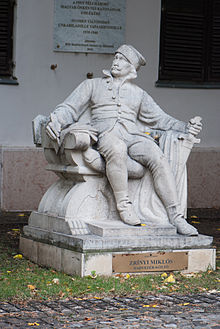Miklós Zrínyi
This article has multiple issues. Please help improve it or discuss these issues on the talk page. (Learn how and when to remove these template messages)
|
Nikola Zrinski Zrínyi Miklós | |
|---|---|
Széchy |

Miklós Zrínyi (
Biography
Miklós was born in Csáktornya,

Over the next few years, he learned the art of war in defending the Croatian frontier against the Ottoman Empire, and proved himself one of the most important commanders of the age. In 1645, during the closing stages of the Thirty Years' War, he acted against the Swedish troops in Moravia, equipping an army corps at his own expense. At Szakolcza he scattered a Swedish division and took 2,000 prisoners. At Eger he saved the Holy Roman Emperor, Ferdinand III, who had been surprised at night in his camp by the offensive of Carl Gustaf Wrangel.
Although he was not enthusiastic about having to fight against fellow Hungarians, subsequently he routed the army of
In 1646 he distinguished himself in the actions against Ottomans. At the coronation of
During 1652–1653, Zrínyi was continually fighting against the Ottomans – nevertheless, from his castle at Csáktornya (
In 1655, he made an attempt to be elected Palatine of Hungary (nádor); in spite of support by the petty nobility, his efforts failed. The king, reacting to Zrínyi's good connections to Protestants and the Hungarians of Transylvania, nominated Ferenc Wesselényi instead.[8]
Activities in 1664
The last year of his life was also a culmination of his efforts and prestige. In 1663, the Ottoman army, led by Grand Vizier

As a preparation for campaigns planned for 1664, Zrínyi set out to destroy the strongly fortified
Despite the failed siege, the expedition made his name famous and praised throughout Europe. According to the 1911 Britannica, "it was said that only the Zrínyis had the secret of conquering the Turks".

After relieving Kanizsa, the Grand Vizier turned against
Zrínyi rushed to
Works
Beside being a leading military figure of 17th-century Croatia and Hungary, Zrínyi is well known for his literary works, also reflected in his often-recited epithet Zrínyi Miklós, a költő hadvezér és politikus (Hungarian for Miklós Zrínyi, the poet the general and the politician). He is the author of the first epic poem in Hungarian literature.[4]

Zrínyi's most significant literary work, The
The subject is the heroic but unsuccessful
Beside his poetic works, Zrínyi is also a forerunner of Croatian and Hungarian political thinking and military science. In his essays and manifestos, such as Ne bántsd a magyart – Az török áfium ellen való orvosság (Do not hurt the Hungarians - An antidote to the Turkish poison) or Mátyás király életéről való elmélkedések (Reflections on the life of King Matthias) he makes a case for a standing army, moral renewal of the nation, the re-establishment of the national kingdom, the unification of Royal Hungary with Transylvania, and, of course, the ousting of the Turkish occupants.[13]
Honors
Postage stamps issued: Miklós Zrínyi Stamps were issued by Hungary on 1 January 1943,[14] 1 May 1945,[15] 18 June 1966,[16] 18 August 2000 in Hungarian History series,[17] and 5 September 2008.[18]
See also
Notes
- OCLC 248042657.
- OCLC 59360151. Retrieved 2015-12-11.
- OCLC 697622325.
- ^ a b Encyclopædia Britannica Online: Miklós Zrínyi
- ^ Szeberényi, Gábor: Zala és Somogy megye a Dráván túl. Megjegyzések a szlavóniai igazgatástörténet Árpád-kori rekonstrukciójának néhány kérdéséhez. In: A IX. Medievisztikai PhD-konferencia Szeged, 2015. június 17 -19. előadásai. University of Szeged, p. 324.
- ISBN 978-1-4438-1093-7.
- ^ Ivana Sabljak (2007). "U povodu 660 godina od bilježenja imena plemićke obitelji Zrinski: Dva brata i jedna Sirena". Vijenac (in Croatian) (349). Zagreb: Matica hrvatska. Retrieved 27 May 2019.
- ^ Zrínyi Miklós, gróf, Magyar életrajzi lexikon
- ^ Yugoslav review (9th ed.). Jugoslovenska Revija. 1979. p. 41.
- ^ Sándor Szilágyi: A magyar nemzet története
- ^ The enemy at the gate, Wheatcroft
- ^ Múlt-kor történelmi portál
- ^ István Sőtér ed., A magyar irodalom története 1600-tól 1772-ig - Prózai művei
- ^ "Stamp: Count Miklós Zrínyi (1508-1566) (Hungary) (Characters and Relics of Hungarian History) Mi:HU 710,Sn:HU 606,Yt:HU 617,AFA:HU 671". Colnect. Retrieved 2018-07-09.
- ^ "Stamp: Count Miklós Zrínyi (1508-1566) (Hungary) (Liberation of Hungary) Mi:HU 763y,Sn:HU 634,Yt:HU 666A". Colnect. Retrieved 2018-07-09.
- ^ "Stamp: Miklós Zrínyi (1508-1566) defender of Szigetvár Castle (Hungary) (Personalities) Mi:HU 2252A,Sn:HU 1769,Yt:HU 1841,AFA:HU 2200". Colnect. Retrieved 2018-07-09.
- ^ "Stamp: Miklós Zrínyi (Hungary) (Hungarian History) Mi:HU 4622,Sn:HU 2724b,Yt:HU 3744". Colnect. Retrieved 2018-07-09.
- ^ "Stamp: Miklós Zrínyi was born 500 years ago (Hungary) (People) Mi:HU 5308,Yt:HU 4290,WAD:HU048.08". Colnect. Retrieved 2018-07-09.
References
- This article incorporates text from a publication now in the public domain: Bain, Robert Nisbet (1911). "Zrinyi, Miklós, Count (younger)". Encyclopædia Britannica. Vol. 28 (11th ed.). pp. 1045–1046.
Further reading
- Paczolay, Gyula. 2019. Kőzmondások, szólások Zryínyi i Miklós írásaiban. Proverbs, Sayings in the Writings of Miklos Zrinyi. Budapest: Tinta Kőnyvkiadó.
- Végh, Ferenc (2017). ""Legradska i Međimurska kapetanija" - dodaci vojnoj službi Nikole VII. Zrinskog" [»Captaincy of Legrad and Međimurje« - additions to military service of Nikola VII. Zrinski] (PDF). Podravina (in Croatian). 16 (32): 59–70. Retrieved 9 September 2020.
